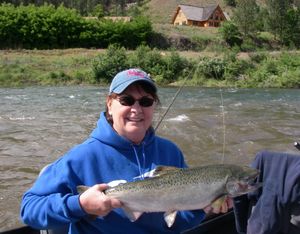Spring chinook anglers could find Clearwater holes crowded
FISHING -- Getting the best spot on the most productive holes has often beena challenge and a cause to rise early for spring chinook anglers headed to Idaho's Clearwater River.
This year the competition for good fishing spots could be even more keen, says Eric Barker, outdoors editor for the Lewiston Tribune.
Read on for his detailed story about the spring chinook season that opened this weekend as springers are just beginning to surge from the Columbia toward Idaho waters.
A below-average return of spring chinook prompted the Idaho Department of Fish and Game to close long stretches of the river and to limit fishing to Fridays through Mondays.
"They are going to shove a lot of people into a little area and everybody is going to be fighting for spots," said Toby Wyatt, owner of Reel Time Fishing of Clarkston. "It's going to be mayhem."
The river will be closed to chinook fishing from Arrow Bridge to the mouth of the North Fork and from Greer Bridge to the mouth of the South Fork. The Lochsa River won't open at all and only a short section of the South Fork Clearwater, from the State Highway 13 bridge near the Harpster Grade to the State Highway 14 bridge near the Mount Idaho Grade, will be open.
That will make for stiff competition when it comes to territory.
"People who want to get in those holes are going to have to get there at 3 in the morning," Wyatt said.
Joe DuPont, fisheries manager for the Idaho Department of Fish and Game at Lewiston, said some people will be forced to find new places to fish and others will contend with crowding at their favorite holes.
"People used to fishing in one area might see people they haven't seen before, so yes, there is going to be a need for people to get along."
He said the Clearwater regulations were designed to try to ensure the small number of chinook available for harvest are shared evenly over time and throughout the river system. This year's run, as measured at Bonneville Dam, got a late start. Fisheries managers like DuPont still don't know if the run is simply late, as it has been over the past few years, or weaker than expected.
To make sure enough adults return to Clearwater River hatcheries to meet spawning targets, the department took a conservative approach to season setting. That means if the run is simply late, there is a chance there will be more fish to catch than expected.
DuPont said the department prefers to loosen regulations if the strength of the run allows rather than to be overly optimistic and have to shut fishing down early.
"I'm hoping we can expand areas and expand days, but I guess that is yet to be determined."
Outfitter Jason Schultz of Hells Canyon Sport Fishing at Lewiston said he thinks there is some reason to believe the run might be stronger than the forecast used to set fishing regulations. According to his theory, fishing in the lower Columbia River in Oregon and Washington is concentrated on the early part of the run. Fish that return to Idaho have the furthest to swim, so they are generally the first to pulse through the lower Columbia and because of that they face heavy fishing pressure. But the Idaho fish that bring up the rear face less pressure downriver and have a better shot at reaching their destinations.
"Over the years, it is making our run later and later and later," Schultz said.
Evelyn Kaide, owner of the Guide Shop and Clearwater Drifters at Orofino, said planning for spring chinook fishing is nearly impossible.
"We've had some really good years and some bad years and we've gotten stopped in the middle of the season and then had it reopen," she said. "Everyone of them has been different."
Many outfitters like Kaide, Schultz and Wyatt book trips before the season starts and are now juggling to compensate for the days of the week fishing won't be allowed.
"It's tough and it's very nerve-racking," Kaide said.
But she said once people start fishing, they should try their best to get along and forget about the hassles of booking trips or getting their spots.
"You just got to let it go and just fish," she said.For those looking to avoid the crowds, the vast stretches of lower Salmon and Little Salmon rivers and the Snake River in Hells Canyon will be open seven days a week.

